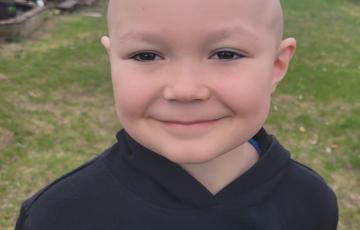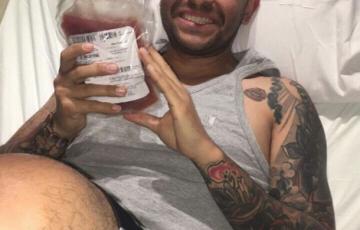Search Results
Noah
Noah was diagnosed with B-cell acute lymphoblastic leukemia (B-ALL) on January 20, 2021. He was just six years old. We noticed Noah had a lot of bruising, dark circles under his eyes, his skin became very pale in color, and he was very fatigued. We took him to his pediatrician where they ran a lot of lab work. The next morning, we received a call stating that his labs did not look good and that he needed to see a pediatric oncologist right away.

Sophia
My wife and I would have never heard of The Leukemia and Lymphoma Society (LLS) if it were not for losing our 12-year-old daughter on March 12, 2013 to undiagnosed leukemia. If you've heard me speak of my daughter Sophia, you've heard this word: perfect. Her laugh, her eyes, her beautiful smile were all perfect. Sophia was a loving, kind and compassionate child. She loved her friends, her dogs (Katie & Daisy), and her family. Perfect. Sophia's story is very different from others.

Sal
Meet Sal. Chronic Myeloid Leukemia Survivor. Florida. Sal was diagnosed with chronic myeloid leukemia (CML) before his daughter Olivia celebrated her first birthday. After multiple courses of treatment proved unsuccessful, he underwent a bone marrow transplant in September 2011. Now, almost three years later, Olivia is almost 5 and her Daddy is celebrating his "three-year post-transplant birthday"! Sal is healthy and strong - and has the energy to play and laugh with her. Most beautiful of all, he can now dream of being at her side for all kinds of birthdays to come.
Treatment
It's important that your doctor is experienced in treating patients with chronic leukemia or works in consultation with a chronic lymphocytic leukemia (CLL) specialist. This type of specialist is called a hematologist oncologist.
Types of CLL TreatmentCurrent therapies do not offer patients a cure for CLL, but there are treatments that help manage the disease. Doctors use several types of approaches and treatment for adults with CLL, some at different stages:
Treatment
It's important that your doctor is experienced in treating people who have chronic myelomonocytic leukemia (CMML) or works in consultation with a hematologist oncologist who has experience treating CMML patients.
Types of CMML TreatmentIn most cases, CMML can't be cured, but it can be treated. Doctors use several types of treatment for adults with CMML, although there's no one standard drug therapy for the disease:

Cayden
Cayden was only three years old when he was diagnosed with Philadelphia chromosome-positive acute lymphoblastic leukemia (Ph+ ALL) in April 2020. Before his diagnosis, Cayden was full of energy, and he loved to eat. But then he started to complain about leg pain. We first thought it was just a growth spurt, but the pain got so bad that he could not walk. He also lost his appetite. That wasn’t like him at all, and I knew something was not right. It was the height of COVID-19, but we took him to the emergency room. All of his tests came back negative.
Childhood ALL
About Childhood ALLBecause of new and better therapies, cancer survival rates for children have improved dramatically during the last several decades. Scientists continue to search for the causes of childhood leukemia so they can develop better treatments with less toxic side effects.
Signs and Symptoms
People who have chronic myeloid leukemia (CML) may not have any symptoms at first. Often, patients learn they have CML after a routine physical exam or a blood test. CML signs and symptoms tend to develop gradually. Those with symptoms often report experiencing:
Diagnosis
Diagnosing chronic myelomonocytic leukemia (CMML) usually involves a series of repeated tests, including blood and bone marrow tests. Your doctor usually can't confirm a diagnosis of CMML with one lab test result that shows abnormal blood counts. Instead, he or she will monitor you over a period of time with repeated lab tests that show abnormal blood counts. This is done to rule out other diagnoses.
Bone marrow testing involves two steps usually done at the same time in a doctor's office or a hospital:

Patty
On January 19, 2012, I lost the love of my life to acute myeloid leukemia (AML). We were together for 21 years and this was not how our love story was supposed to end. Too young, too soon… still so much to do, to see, to experience – How do you go on? How do you continue life without the other half of you? How do you stop crying in the shower, before the water runs cold? How do you get dressed, put on a smile and face the world – alone? How do you believe again, when everything you believed in is gone?

Jordana
Jordana was busy being a mom, wife, and radio host when she began experiencing fatigue, hot flashes, and bruising in the fall of 2020.
“I've been feeling crappy for a few months, very fatigued. About two weeks ago I noticed some large bruising on my legs but didn't remember bumping myself,” Jordana wrote in her first journal entry on CaringBridge. “I went for some bloodwork. Tuesday night my doctor called and said I need to go to the ER as my platelets were low. They admitted me, did a bone marrow biopsy, and 12 hours later told me I had leukemia.”
Radiation Therapy
Radiation therapy uses X-rays or other high-energy rays to kill cancer cells. Radiation therapy is sometimes used to treat a person with CLL who has an enlarged (swollen) lymph node, spleen, or other organ that is blocking the function of a neighboring body part, such as the kidney or the throat.
Chemotherapy and Drug Therapy
Chemotherapy drugs kill fast-growing cells throughout the body, including both cancer cells and normal, healthy cells. The damage to normal, healthy cells can cause side effects. Chemotherapy is typically given in cycles. Each cycle is made up of a certain number of days of treatment, followed by a certain number of days of rest.

Maurice
On July 15, 2018, I went to the ER after feeling sluggish and weak the day before. I was kept in the hospital and on July 17, I was diagnosed with acute lymphoblastic leukemia (ALL).
Leukemia changed my life. From that day, I received chemotherapy for 43 days. It took me at least eight months to achieve remission and it was and still is a very hard fight. But I refused to give up. I am now a candidate for a bone marrow transplant.
Refractory and Relapsed Childhood ALL
Most children with ALL are cured with standard chemotherapy treatments. But about 15 percent of young patients have ALL that returns after remission. This is referred to as a “relapse” of the disease (or “relapsed ALL”). Some children are unable to achieve a remission because their cancer does not respond to treatment. In these cases, the disease is referred to as “refractory” (or “refractory ALL”).
Treatment Outcomes
Parents of JMML patients are advised to discuss survival information with their child’s hematologist-oncologist. Keep in mind that outcome data can show how other children with JMML responded to treatment, but it cannot predict how any one child will respond.
CLL Staging
Many doctors use a system called staging to help predict the likely outcome of the disease and to plan treatment for people with CLL. There are three staging systems that doctors use: the Rai staging system, the Binet staging system and the CLL International Prognostic Index (CLL-IPI). Although the Rai and Binet staging systems are still widely used, they have certain limitations in predicting which patients will have a more aggressive disease.
Follow-Up Care
Find more information about follow-up care, including what to expect, long-term and late effects of treatment, survivorship clinics, and other resources, such as The National Comprehensive Cancer Network (NCCN) treatment guidelines.

Bill
My name is Bill Bannon. I am a semi-retired child support magistrate for the Minnesota State Courts. In April 2017 I experienced shortness of breath, a sore-throat and bleeding gums. I was diagnosed with acute myeloid leukemia (AML), was stabilized, and started on intensive chemotherapy. It was soon learned that I had a FLT-3 mutation of this cancer, the most serious and difficult to treat. The only possibility for any chance at survival was a bone marrow or umbilical stem cell transplant (BMT). I chose to continue my treatment at the University of Minnesota.

Zeke
On April 16, 2022, I brought my son Ezekiel "Zeke" to a sick appointment because of leg pain, stomach pain, and a fever over the last few days. We were sent for some additional testing (bloodwork and an X-ray of his stomach area). Later that day, we received a call from the doctor saying we needed to get Zeke back to the hospital fast because his bloodwork wasn't normal, and he had an enlarged liver and spleen. We woke up Easter morning in the hospital for the first of what would become over 100 nights at the hospital throughout his treatment.

Tak Wah Mak, Ph.D.
A Leading Scientist Studying Precision Medicine Approaches for Leukemia and Lymphoma
Dr. Tak Wah Mak is one of the world’s most cited and accomplished scientists. After earning his PhD, Mak was recruited by the Ontario Cancer Institute (now Princess Margaret Cancer Centre) in Toronto, Canada for a postdoctoral fellowship.

GiGi
When I was diagnosed in 2002 I was in such a fog, all that I can really remember is the doctor saying "You have..." I had acute myeloid leukemia and given 6 weeks to live. I just felt that could not be the end for me.
I went through the chemo, hospital stays all while trying to raise 4 small children and I made it through it all. Thank goodness, right? Fast forward to 2017 the day after my 48th birthday. I began to feel weak and extremely fatigued, without trying to "self- diagnose" myself, this feeling was all too familiar.

Aleta
I was diagnosed on August 13, 2013 with T-cell acute lymphoblastic leukemia. It was totally out of the blue. I had been married for just a year at the time of my diagnosis and sadly my husband couldn't handle a wife with cancer and we divorced.

Andre
In July 1993 I was blessed with my son, Andre Christopher Jordan. He's my heart, pride and joy. Throughout his young life, Andre's has humbled me with his love, kindness, strength, loyalty and faith. Two years ago, he and his fiancé, Ana were blessed with their son. He was overjoyed with being a new father and had marriage plans in the works. He had just received a promotion at work that he had worked hard for and all was well. Then suddenly, Andre's life suddenly took a tragic turn.